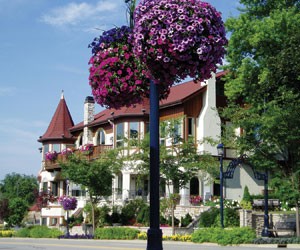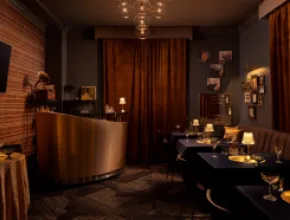Meeting in a historic destination can be a welcome change of pace for attendees. Compared with urban locales, which all too often include heavy traffic, jammed restaurants and hotels hosting multiple groups, most historic destinations offer a quieter, more intimate environment.
“There tends to be a lot of unique attributes in a community rich in history,” says Jamie Furbush, president of the Frankenmuth Chamber of Commerce and CVB, located in eastern Michigan. “It makes it more appealing for people to come for a meeting and convention and even for spouse trips. I think it increases attendance.”
Historic places can also serve as welcome alternatives to the confines of a traditional business environment, according to Furbush.
“When you are in a place that is charming and historic, it allows your mind to focus,” she says. “When you are finished with your meeting, being in a historic destination lets your mind escape so you can truly recuperate from a day’s session.”
The Midwest has an array of historic destinations, many of which host meetings on a regular basis and offer impressive group venues and accommodations.
Galena, Ill.
A simple stroll down Main Street in Galena, Ill., gives visitors the distinct feeling they are in a destination out of an earlier era. First off, almost every storefront is brick and looks like it dates from the early 1900s. American flags hang from lantern-style light posts. People walk by and smile.
Located about three hours west of Chicago near the Mississippi River, Galena is a charming community that attracts history buffs from all over the country. The town of a little more than 3,300 residents got its start as a lead mining town, enjoying prosperity from mining until the California Gold Rush came along in 1849.
“Galena was the mining capital along the Mississippi River before the Gold Rush,” says Celestino Ruffini, director of sales and marketing for the Galena/Jo Daviess County CVB. “After that, people left and headed out West. Back in the 1800s, though, the Galena River was a main thoroughfare for large steamboats and lots of trading.”
It wasn’t until later in the mid-1800s, when Civil War Gen. Ulysses S. Grant moved to the sleepy town, that people started coming back.
“Grant was here in spring 1860 and left a year later to serve in the Civil War,” Ruffini says. “When he came back in 1865, the city gave him a home to live in. He was here when he received the telegraph stating he was elected president.
“In 1904, after he had passed away, the house was given back to the city of Galena to be preserved,” Ruffini continues. “We’ve been a tourist destination ever since.”
Today, groups can tour Grant’s home as well as various other historic sites, including the home of former congressman Elihu B. Washburne; The Old Market House, the center of community life during the mid-1800s; and the Galena History Museum.
Among the most popular group hot spots is Eagle Ridge Resort & Spa, home to 15,000 square feet of meeting space and outdoor areas that overlook Lake Galena. Others include Fried Green Tomatoes, a local restaurant favorite with space for groups; and Chestnut Mountain Resort, offering 5,400 square feet of meeting space and the group-friendly Sunset Grille.
Groups are also welcome to meet at Galena Cellars Vineyard and Winery, located right on Main Street, and Massbach Ridge Winery, located a few minutes away in Elizabeth, Ill.
Also in Elizabeth, groups can visit Apple River Fort, site of a Black Hawk War battle in 1832.
Stillwater, Minn.
“Stillwater was formed in the mid-1800s as a lumber town; it was a boom town,” says Steve Roll, board member of the Stillwater CVB. “We have many renovated homes from the 1800s, which are pretty impressive.”
Visitors can hop on a trolley and listen to a narrated historic tour of the area. Another group-friendly option is a private cruise on the river with the St. Croix Boat & Packet Co.
One such establishment, Luna Rossa Trattoria & Wine Bar, is a group favorite not only because of its banquet rooms, but also because of the tours it gives of the historic Joseph Wolf Brewery Caves. Thirty-minute tours are offered on the weekends, during which guides give detailed descriptions of the caves and explain how they were used in the late 1800s.
Stillwater also boasts a number of charming bed-and-breakfasts suitable for small to mid-sized groups. They include Rivertown Inn, The Ann Bean Mansion, Aurora Staples Inn, Lowell Inn, Water Street Inn and The William Sauntry Mansion.
Amana Colonies, Iowa
Tucked into a stretch of land about 30 minutes south of bustling Cedar Rapids, Iowa, lies a collection of seven quiet, historic villages known as the Amana Colonies.
The villages were founded in 1855 when a group of religiously persecuted German immigrants settled in Iowa to set up a communal society.
“They left the Lutheran church in Germany and formed their own church here,” says Kristie Wetjen, executive director of the Amana Colonies CVB. “People lived communally and the church owned everything. Jobs, health care, education and shelter were provided. It ended in 1932 and we basically consider that ‘The Great Change.’
“The church thought it wouldn’t continue and thrive because of the Great Depression, so all of the church members voted to adopt capitalism,” Wetjen says.
Today, visiting tourists as well as meeting groups frequent the villages for business and pleasure. Registered as a National Historic Landmark, there are several museums that depict life back in the 1800s as well as an untouched general store.
“It is kind of like Little House on the Prairie,” Wetjen says. “There are 26,000 acres of farm and timber ground here. We have Iowa’s only operating textile mill here, which has been continually operating since the 1850s.”
Groups can meet at the Amana Colonies Golf Club, which offers condos where attendees can stay overnight.
Wetjen suggests meeting at The Old Creamery Theatre, a unique venue for midsized groups.
“The theater has seating for 300 people,” she says. “It is a great place to bring speakers in.”
Family-style dining is the way of life in the Amana Colonies and groups can get a taste of the culture at several area restaurants.
The Ox Yoke Inn has space for group gatherings, as does The Ronneburg Restaurant and Colony Inn Restaurant, which has been around since 1935.
Groups can stay at nearby properties such as Zuber’s Homestead Hotel and Coralville Marriott Hotel & Conference Center.
Frankenmuth, Mich.
Ever wanted to hold a meeting in Bavaria but couldn’t afford the time or travel cost? If so, head over to the east side of Michigan to the little town of Frankenmuth, dubbed “Michigan’s Little Bavaria.”
“We were founded in 1845 by a group of German Lutheran missionaries,” says Frankenmuth CVB’s Furbush. “They wanted to spread Christianity to the Native Americans in the area. That was the purpose of the settlers who came here. The word Frankenmuth is broken into two parts. Franken is the area of the state of Bavaria where the settlers came from. Muth means courage in German.”
Today, Frankenmuth is a visitors’ haven. Only a little more than two square miles, the town is very walkable, with shops, restaurants and attractions along the way.
“The Bavarian ambience is very charming,” Furbush says. “The flower-lined streets are very tranquil and really breathtaking. Walking down the street or heading to dinner is a very inviting, warm experience. Meeting attendees really enjoy it.
“We are very well known for our Gemutlichkeit,” Furbush adds. “Which is the warm, hospitable feeling you get when you are here.”
In addition to its charm, Frankenmuth can accommodate both small and large groups.
The Bavarian Inn Lodge is the area’s largest group venue, with space for up to 500 people as well as a waterpark. The property also has a large restaurant with the ability to accommodate groups.
Zehnder’s of Frankenmuth is a popular eatery that can seat up to 350 for group gatherings. Another unique venue is Fischer Hall, a historic property that is available for concerts as well as events. MA
—Katie Morell is a Chicago-based freelance writer and former Meetings Media editor. Growing up in Michigan, some of her fondest childhood memories centered around her family’s yearly visit to Frankenmuth.






